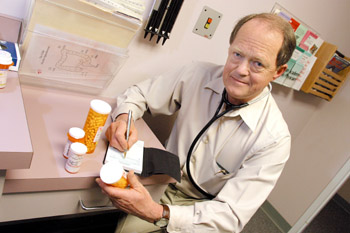![[Metroactive News&Issues]](/gifs/news468.gif)
[ North Bay | Metroactive Home | Archives ]
Medical Emergency: Dr. Douglas Pile will lift his clinic's boycott of GlaxoSmithKline once they agree to lower prices by 25 percent or supply Canadian pharmacies.
Border Dispute
Healdsburg doctors boycott GlaxoSmithKline
By Joy Lanzendorfer
When Dr. Douglas Pile heard that one of the largest drug companies was cutting off supplies to Canadian pharmacies because Americans were buying drugs over the Internet at discount prices, he decided to put his foot down. Along with the other three doctors at Healdsburg Primary Care, a medical practice that serves more than 10,000 local patients, Pile decided to boycott the $32 billion GlaxoSmithKline.
"I just thought it was a reasonable thing to do," says Pile. "They drew a line in the sand that said they would no longer sell to Canadians. I said, fine, I'll see to it that you don't sell to Americans either."
Though the medical center will continue to refill old Glaxo prescriptions, they will not be writing any new prescriptions for Glaxo's drugs unless there is no alternative brand available. Glaxo has many well-known products, including Paxil, Wellbutrin, and Flonase, as well as over-the-counter products like Tums, Nicorette, Tagamet, and Aquafresh toothpaste.
But Healdsburg Primary Care isn't the only group boycotting Glaxo. In fact, boycotts have sprung up nationwide. The largest is the Tums Down Campaign, a boycott of Glaxo's over-the-counter products. It includes senior groups from dozens of states, including Senior Action Network in San Francisco. On Feb. 27, SAN held a Tums Down demonstration on Fourth and Howard streets in San Francisco, where Glaxo representatives were holding a business meeting.
It's obvious Glaxo's decision to restrict Canadian sales has struck a nerve. And no wonder. Glaxo is attacking one of the few ways Americans can get around high drug costs: ordering drugs online from Canadian pharmacies for half or two-thirds the cost.
The company says its actions are not motivated by the money it is losing from Americans buying from Canadians but are meant to "prevent non-FDA-approved drugs from being sold by Canadian Internet pharmacies to U.S. consumers." Glaxo wants patients to receive the right drugs legally and safely by buying from U.S. pharmacies.
But the boycotting groups are skeptical of Glaxo's claims that its actions are motivated by safety and not profit.
"It's perfectly legal and safe to sell drugs over the Internet," says Bruce Livingston, executive director of SAN. "Glaxo just doesn't like the possibility of the prices they give to 33 million Canadians being transferred to the U.S. market."
Many deeply feel the high cost of prescription drugs in the United States. Some, especially senior citizens on fixed incomes, are struggling to afford much-needed medical supplies. While these people may have enough money to keep them from qualifying for need-based programs that can assist in the purchase of drugs, the monthly bills can still be steep. Some of Pile's patients pay between $350 and $1,000 a month for prescriptions.
Buying prescription drugs from Mexico or Canada has gone on for years. Some patients take vacations in those countries specifically to buy a year's worth of prescriptions at a cheaper price, combining vacation with necessity. The Internet has made it possible for people who don't have the money, time, or physical capability to visit the countries directly to still buy drugs at a reduced price.
"The question shouldn't be why are Canada's drugs so much cheaper, but why are drugs so expensive in the U.S.," says Livingston.
The high cost of drugs is one of the biggest contributors to the current healthcare crisis. Drug prices have skyrocketed in the last few years, rising as much as 20 percent a year. To combat the demand for drugs, spun partially from drug advertising on national TV, doctors have increased prescriptions for generic drugs. The problem is that now the price of generic drugs is rising as well. While they used to be one-quarter or one-tenth the cost of brand-name drugs, they are now half or three-quarters the price.
All this profit has made drug companies a favorite investment on Wall Street, adding to the pressure to make a profit.
Healdsburg Primary Care will lift its boycott of Glaxo when the company returns to supplying the Canadian pharmacies or lowers its U.S. prices by 25 percent.
"They would get a huge market share if they did that," laughs Pile. "But there isn't a lot of incentive for them to lower prices. They have a captive market in the U.S."
He hopes his boycott will inspire other doctors to take steps in their own practices against the system.
"Obviously, this is larger than just one company," he says. "I hope our boycott will capture other doctors' imaginations that we can make a difference. We can bring about change in our current healthcare system."
[ North Bay | Metroactive Central | Archives ]
Copyright © Metro Publishing Inc. Maintained by Boulevards New Media.
![]()

Photograph by Michael Amsler
From the March 6-12, 2003 issue of the North Bay Bohemian.